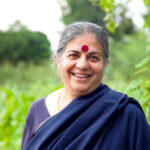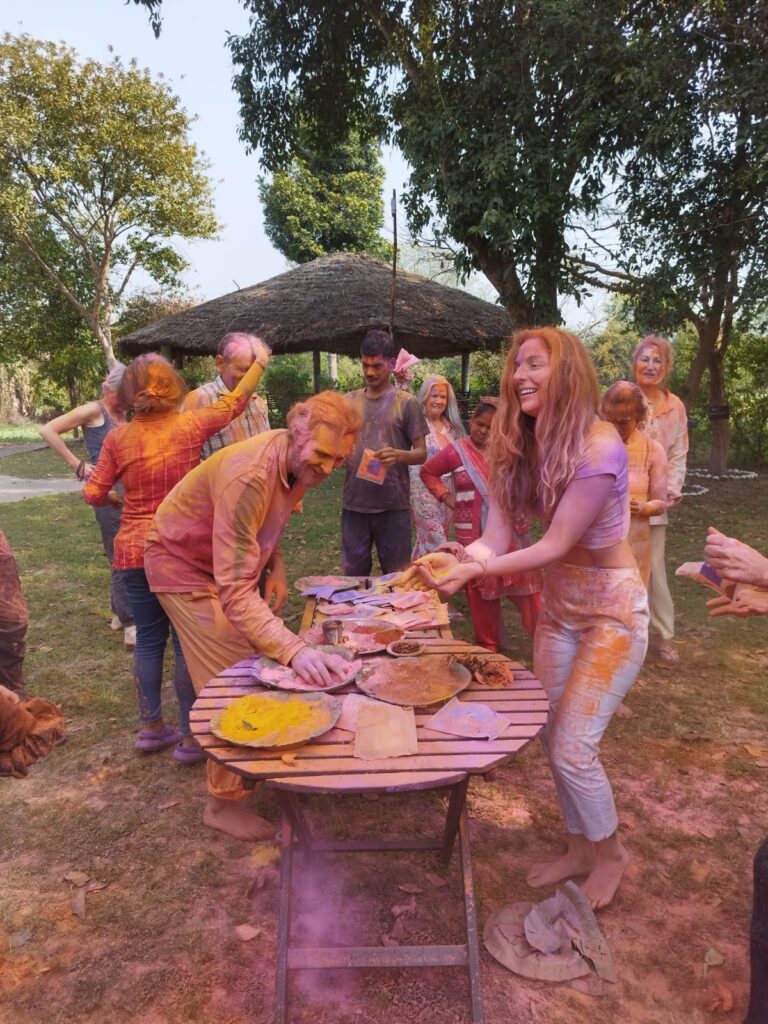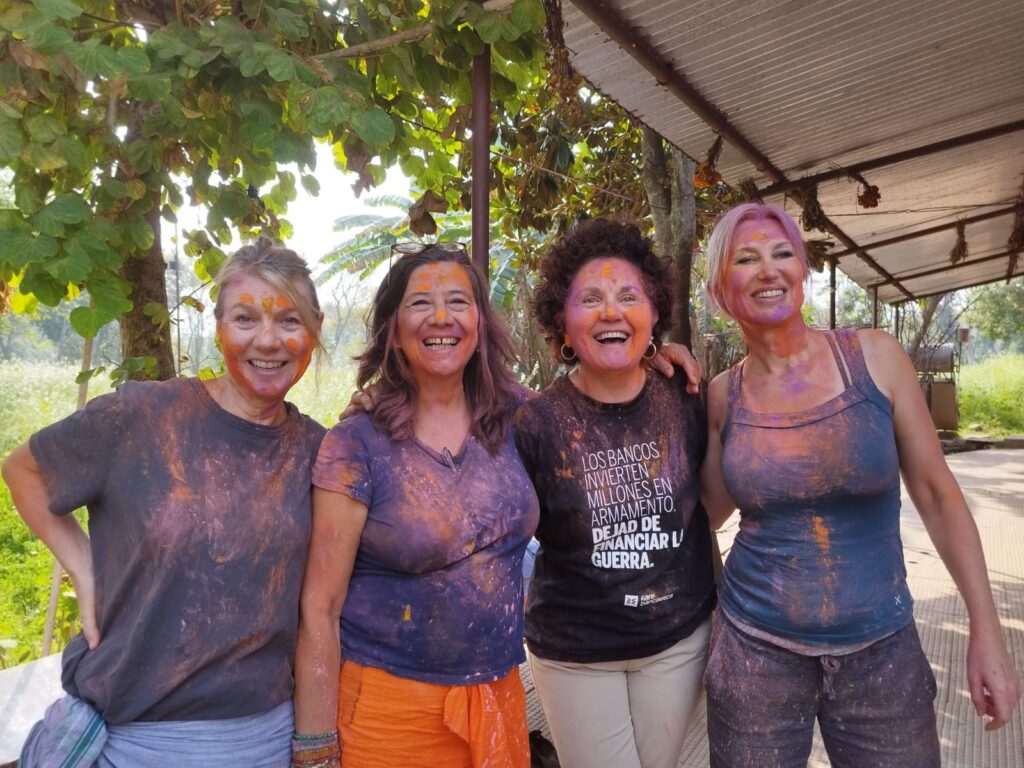Holi: The Colours of Biodiversity
TRANSCEND MEMBERS, 13 Mar 2023
Prof. Vandana Shiva | Navdanya International – TRANSCEND Media Service
8 Mar 2023 – This year, International Women’s Day falls on the same day of Holi, the festival of colours, joy and diversity: 8 March. On this day, millions of people take to the streets to celebrate the coming of spring by throwing coloured powders. Over the years, however, these colours have become increasingly unnatural and often toxic as industrial chemical production has supplanted traditional, natural production.
On the Navdanya farm, at the Earth University, we teach how to produce these colours naturally by extracting them from plants. These are the colours coming from biodiversity, reminding us how important diversity is, in nature and in our society.
More than 20 years ago, Navdanya started the campaign to recover the use of natural ingredients to produce colours for Holi, and initiated the Diverse Women for Diversity movement, which gathers women from different regions and nations of the world, diverse in culture, religion and socio-economic conditions. At the WTO summit in Seattle in 1999, we declared our common goal: ‘biological and cultural diversity as the foundation of life on earth. Therefore, we stand for self-sufficiency, self-reliance and solidarity, locally and globally”.
Diverse Women for Diversity is a network developed through our work at the UN World Food Summit to keep Food Sovereignty in the hands of women, to challenge corporate agribusiness predatory practices that are at the root of multiple crises, from hunger, to chronic diseases and biodiversity destruction. We also work within the context of the Convention on Biological Diversity, in defence of Earth, human rights and future generations.
For thousands of years, women have guaranteed food security for their children and communities. Even today, the primary work of maintaining household food security through local food production, processing and distribution is done by women.
As far as 1996, on the occasion of the Conference on Plant Genetic Resources in Leipzig, we declared:
“Food security for all is not possible within a global market system based on the dogma of free trade, permanent growth, comparative advantage, competition and profit maximization. On the other hand, food security can be achieved if people within their local and regional economies feel responsible, both as producers and as consumers for the ecological conditions of food production, distribution and consumption, and for the preservation of cultural and biological diversity where self-sufficiency is the main goal.
Our food security is too vital an issue to be left in the hands of a few transnational corporations with their profit motives, or up to national governments that increasingly lose control over food security decisions, or to a few, mostly male national delegates at UN conferences, who take decisions affecting all our lives.
Food security must remain in women’s hands everywhere! We will resist those who force us to produce and consume in ways that destroy nature and ourselves.”
Over the years, starting in the 1990s, we have held many meetings. This year, from 2 to 8 March, over 150 women from all over the world gathered at the Navdanya farm in Dehradun, India, for the international Diverse Women for Diversity festival.
About fifty representatives from more than twenty countries, including Latin and North America, Europe and United Kingdom, Japan, Australia and Africa, joined more than one hundred representatives of local movements from 21 States in India and Southeast Asia, in order to celebrate together the diversity of cultures, food and knowledge. We stand for cultural diversity; we are for biological diversity in all its forms. We stand against the monoculture of the mind and against the new surveillance system, which is the ultimate form of militarisation of society. We defend the freedom of people and the freedom of all species to be and evolve in harmony.
About 20 years ago, just as we had started to get rid of poisons in our food and co-create with biodiversity, to use plants and trees as pest control agents, to turn biomass and organic matter into fertiliser, in Holi we have regenerated and resurrected the amazing biodiversity of colours. Every plant gives us a colour, and we make our own colours. So, also in this case, biodiversity is the answer to chemicals.
Biodiversity is the answer to oil and fossil fuels. Biodiversity is what is conserved by indigenous people and women. In the 20% of the world’s land where indigenous people are, 80 percent of the biodiversity is conserved. And they conserve the knowledge on Biodiversity, of which plant is a healing plant, which plant is a colouring plant, which plant is a pest control plant. That knowledge is in the hands of women.
And so we celebrate both Women’s Day with Diverse Women For Diversity and Holi as the day of diversity with nature.
_______________________________________________
This post is also available in: Italiano
 TRANSCEND Member Prof. Vandana Shiva is a physicist, ecofeminist, philosopher, activist, and author of more than 20 books and 500 papers. She is the founder of the Research Foundation for Science, Technology and Ecology, and has campaigned for biodiversity, conservation and farmers’ rights, winning the Right Livelihood Award [Alternative Nobel Prize] in 1993. She is executive director of the Navdanya Trust.
TRANSCEND Member Prof. Vandana Shiva is a physicist, ecofeminist, philosopher, activist, and author of more than 20 books and 500 papers. She is the founder of the Research Foundation for Science, Technology and Ecology, and has campaigned for biodiversity, conservation and farmers’ rights, winning the Right Livelihood Award [Alternative Nobel Prize] in 1993. She is executive director of the Navdanya Trust.
Go to Original – navdanyainternational.org
Tags: Diverse Women for Diversity, Holi, India, International Women's Day, Navdanya International, Vandana Shiva, Women
DISCLAIMER: The statements, views and opinions expressed in pieces republished here are solely those of the authors and do not necessarily represent those of TMS. In accordance with title 17 U.S.C. section 107, this material is distributed without profit to those who have expressed a prior interest in receiving the included information for research and educational purposes. TMS has no affiliation whatsoever with the originator of this article nor is TMS endorsed or sponsored by the originator. “GO TO ORIGINAL” links are provided as a convenience to our readers and allow for verification of authenticity. However, as originating pages are often updated by their originating host sites, the versions posted may not match the versions our readers view when clicking the “GO TO ORIGINAL” links. This site contains copyrighted material the use of which has not always been specifically authorized by the copyright owner. We are making such material available in our efforts to advance understanding of environmental, political, human rights, economic, democracy, scientific, and social justice issues, etc. We believe this constitutes a ‘fair use’ of any such copyrighted material as provided for in section 107 of the US Copyright Law. In accordance with Title 17 U.S.C. Section 107, the material on this site is distributed without profit to those who have expressed a prior interest in receiving the included information for research and educational purposes. For more information go to: http://www.law.cornell.edu/uscode/17/107.shtml. If you wish to use copyrighted material from this site for purposes of your own that go beyond ‘fair use’, you must obtain permission from the copyright owner.


